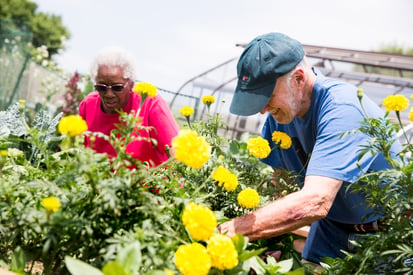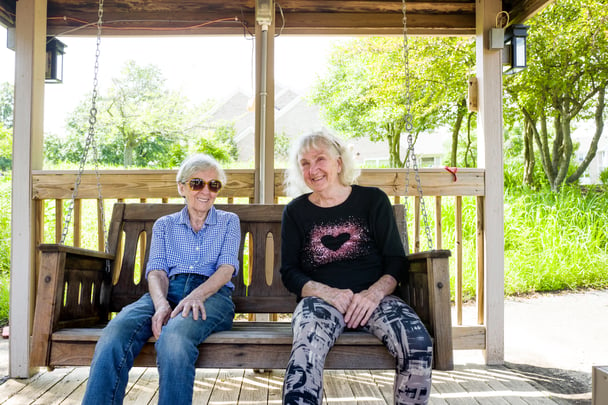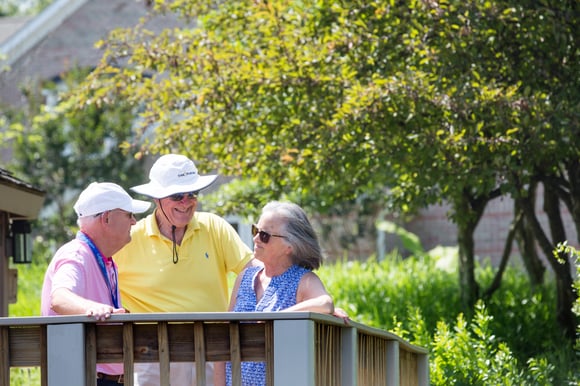The long, leisurely days of summer have arrived, luring us outside to soak up generous hours of sunshine and warm temperatures.
But for older adults, sun and heat can pose certain health risks.
According to the CDC, our bodies don’t sweat as much as we age and are less efficient at regulating temperatures. What’s more, older people are more likely to have chronic health conditions that affect the body’s reaction to temperature. Some medications can also alter responses to heat and sun.
An exacerbating factor is temperatures routinely soaring into triple digits.
An Ounce of Prevention
 Be it gardening, a nature walk, concert in the park, trip to the beach or a casual stroll for ice cream, the possibilities for fun in the sun are endless. Everyone, seniors especially, can enjoy them to the fullest by taking simple precautions to stay safe in the good ol’ summertime.
Be it gardening, a nature walk, concert in the park, trip to the beach or a casual stroll for ice cream, the possibilities for fun in the sun are endless. Everyone, seniors especially, can enjoy them to the fullest by taking simple precautions to stay safe in the good ol’ summertime.
Hydrate, hydrate, hydrate. Dehydration is a common problem among older adults. The thirst sensation decreases as we age, and changes in water and sodium balance occur. It’s especially important to hydrate frequently with water, juices and drinks fortified with electrolytes. Avoid dehydrating alcoholic or caffeinated beverages.
Take cover. Sunburn is a leading cause of skin cancer, which is the most common type of cancer in the United States, and most cases are among people aged 65+. This is largely because older skin loses fat and water and becomes thinner, allowing dangerous ultraviolet rays to penetrate more deeply.
 Regular application of sunscreen with an SPF of at least 30 (no matter your skin type or color) is a must, especially if you’re in the water or sweating a lot. UV wristbands that detect solar radiation take the guesswork out of sunscreen reapplication.
Regular application of sunscreen with an SPF of at least 30 (no matter your skin type or color) is a must, especially if you’re in the water or sweating a lot. UV wristbands that detect solar radiation take the guesswork out of sunscreen reapplication. - Protective clothing includes hats with ear and neck flaps, sunglasses to prevent corneal sunburn and other damage to older eyes and tightly woven linen or cotton apparel in light colors that reflect heat and sun. Long sleeves and pants provide full coverage; some clothing has SPF protection within the fabric.
- Shade is also paramount on sizzling summer days, so be sure to seek areas with plenty of it. If possible, stay close to air conditioning for cooling respite. Be sure to bring a sun umbrella, preferably one with UV protection built right in.
Warm Weather Dangers
Sometimes, despite our best efforts to stay protected, heat and sun can get the better of us. Here are a few common sun- and heat-related conditions and what you or a loved one can do to mitigate them. If these remedies do not bring relief quickly, seek medical attention. Get emergency help immediately in case of heat stroke!
 Heat exhaustion occurs when the body can no longer keep cool. Symptoms include heavy sweating (this may be less pronounced in seniors), thirst, dizziness, weakness, headache, nausea, vomiting, muscle cramps and lack of coordination. Your skin may feel cold and clammy, and you may have a rapid pulse. Rest in a cool place, drink ample hydrating fluids and loosen your clothing. If you don’t feel better soon, seek medical attention, as heat exhaustion can develop into heat stroke.
Heat exhaustion occurs when the body can no longer keep cool. Symptoms include heavy sweating (this may be less pronounced in seniors), thirst, dizziness, weakness, headache, nausea, vomiting, muscle cramps and lack of coordination. Your skin may feel cold and clammy, and you may have a rapid pulse. Rest in a cool place, drink ample hydrating fluids and loosen your clothing. If you don’t feel better soon, seek medical attention, as heat exhaustion can develop into heat stroke. - Heat stroke is a serious medical emergency, causing the body temperature to rise above 104°F. Symptoms are fainting, confusion or unusual behavior, hot, dry, flushed skin without sweating, a strong and rapid or slow and weak pulse. Call for medical help immediately and move the affected person to a cool place. Until help arrives, help lower body temperature with fans, a cool bath, shower or gentle ice compresses. Loosen or remove clothing.
- Dizziness (heat syncope) can come on suddenly in hot weather, causing risk of fainting, falling, and serious injury. This is particularly dangerous for older adults with weaker muscles and brittle bones. If you feel dizzy, move to a cool place to rest. Sit or lie down, elevate your legs and drink plenty of water.
- Sunburn happens. Even those diligent about applying sunscreen can sometimes fall victim to harmful ultraviolet rays. Seek medical attention if a sunburn is severe, causing significant blistering, fever, nausea, headache or fatigue. Drink plenty of water or fluids with electrolytes and apply a topical sunburn relief product with aloe or lidocaine. Cool, damp compresses can also be helpful as well as over-the-counter pain relievers. Frequently apply moisturizer, and do not pick at bumps or blisters to avoid risk of infection. Resist peeling skin, which can expose the tender layers beneath to even greater damage.
Simple precautions go a long way toward keeping the carefree days of summer truly carefree. Take heed and get out there and enjoy!





